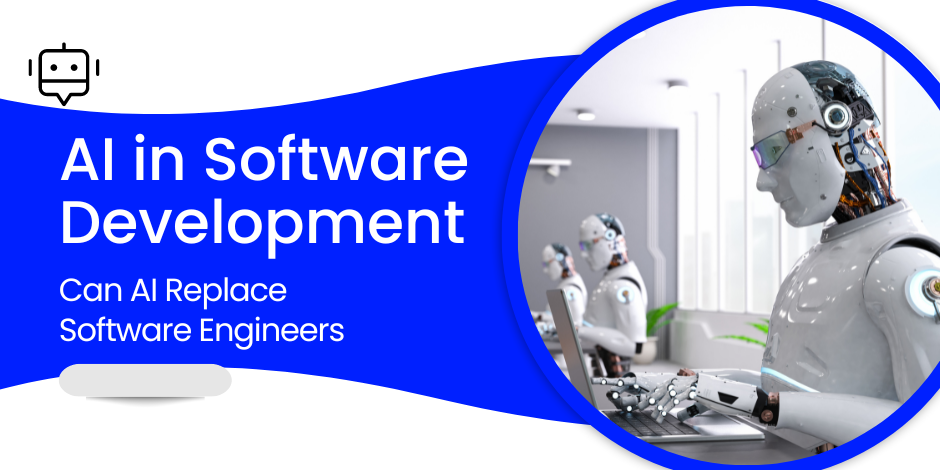AI in Software Development: Can AI Replace Software Engineers?

Stay Informed With Our Weekly Newsletter
Receive crucial updates on the ever-evolving landscape of technology and innovation.
Artificial intelligence (AI) has been making significant advancements in various industries, revolutionizing the way tasks are performed and raising questions about the future of human jobs. One area where this debate is particularly relevant is the realm of software engineering.
With AI continuously improving its capabilities, there is speculation about whether AI could eventually replace software engineers altogether. We will explore the role of AI in technology, the job of a software engineer, AI in software development, and the ethical considerations surrounding AI replacing jobs.
Understanding the role of AI in software development

Before diving into the discussion of AI replacing software engineers, it is essential to understand what AI is and how it has evolved in the tech industry. AI refers to the creation of intelligent systems that can perform tasks without human intervention, often replicating human cognitive abilities such as learning, problem-solving, and decision-making.
Artificial intelligence encompasses different facets, including machine learning (ML), natural language processing, and computer vision. Machine learning, in particular, has been integral to the growth of AI, enabling algorithms to learn from and make predictions or decisions based on data patterns.
But what exactly is machine learning? Machine learning is a subset of AI that focuses on developing algorithms that can learn and improve from experience.
These algorithms are designed to analyze large amounts of data, identify patterns, and make predictions or decisions based on those patterns. This ability to learn and adapt is what sets machine learning apart and makes it a crucial component of AI.
The evolution of AI in the tech industry
The tech industry has witnessed a remarkable evolution of AI over the years. From simple rule-based systems to more sophisticated machine learning algorithms and neural networks, AI has become increasingly capable of performing complex tasks, often surpassing human capabilities in certain domains.
One of the key milestones in the evolution of AI was the development of deep learning algorithms. Deep learning is a subset of machine learning that focuses on training artificial neural networks with multiple layers to recognize patterns and make predictions.
This breakthrough has revolutionized the field of AI, enabling systems to process and understand complex data such as images, speech, and text.
Today, AI is being utilized in various sectors, including healthcare, finance, transportation, and entertainment, to name a few. Its applications range from intelligent personal assistants like Siri and Alexa to autonomous vehicles and fraud detection systems.
In the healthcare industry, AI is being used to analyze medical images and assist in the diagnosis of diseases. Machine learning algorithms can quickly analyze large volumes of medical data, helping doctors make more accurate and timely diagnoses.
In finance, AI is used for fraud detection and risk assessment, where algorithms can identify suspicious patterns and anomalies in financial transactions.
The transportation industry is also benefiting from AI with the development of autonomous vehicles. These vehicles use AI algorithms to perceive and interpret their surroundings, making real-time decisions to navigate safely and efficiently.
AI is also transforming the entertainment industry with recommendation systems that personalize content based on user preferences and behavior.
As AI continues to advance, its impact on various industries is expected to grow exponentially. While there are concerns about AI replacing certain jobs, it is important to recognize that AI is not meant to replace humans but rather augment their capabilities.
By automating repetitive tasks and providing intelligent insights, AI can free up human resources to focus on more complex and creative endeavors.
The job of a software engineer

Now that we have a better understanding of AI’s role in technology let’s delve into the responsibilities of a software engineer. Software engineers design, develop, and maintain software systems, creating solutions for a wide range of industries and applications.
Key responsibilities of software engineers
Software engineers play a pivotal role in the software development lifecycle, working closely with cross-functional teams to define requirements, design architecture, write code, perform testing, and deploy and maintain software systems. They are responsible for ensuring that the software meets quality standards, performance requirements, and functional specifications.
Skills required for software engineering
To excel in the field of software engineering, individuals must possess a combination of technical skills, problem-solving abilities, and a deep understanding of software development principles and practices. Proficiency in programming languages, software design patterns, and debugging techniques becomes imperative for creating efficient and robust software solutions.
AI in software development
With the rise of AI, its influence on software development practices cannot be ignored. AI has already found its way into various aspects of the software development lifecycle, augmenting certain tasks and enhancing the capabilities of software engineers.
How AI is currently used in software development
AI is currently being employed in software development for various purposes. Automated code generation, bug detection, and test case generation are some areas where AI is proving to be beneficial in accelerating the development process and improving the software quality.
When it comes to the role of AI in technology, tools, and frameworks can analyze vast amounts of data to provide software engineers with valuable insights, facilitating better decision-making and enabling the development of software systems that are more efficient, secure, and user-friendly.
Potential future uses of AI in software development
Looking ahead, the potential applications of AI in software development are vast. From automating repetitive coding tasks and optimizing algorithms to enhancing software maintenance and providing intelligent code suggestions, AI has the potential to revolutionize the way software is created and maintained.
Comparing AI and human software engineers

Now, let’s compare the strengths and limitations of AI in software development and human software engineers to gain a better understanding of how they complement each other.
Strengths and limitations of AI in software development
When it comes to AI in software development, it excels in tasks that require processing large amounts of data, recognizing patterns, and performing repetitive tasks with a high degree of speed and accuracy. It can expedite certain aspects of software development and provide valuable insights that might be challenging for humans to discover.
However, AI has its limitations. It lacks the capacity for intuition, creativity, and empathy that humans possess. It struggles with understanding contextual nuances and making judgment calls based on ethical considerations.
Strengths and limitations of human engineers
Human software engineers possess unique abilities that AI cannot replicate. Their creativity, problem-solving skills, and ability to understand and respond to human needs make them integral to software development.
Human engineers excel at tasks that involve critical thinking, making informed decisions, and understanding the broader context in which software operates.
However, human engineers are not immune to errors, and the complexity of software systems can sometimes lead to challenges. Human engineers may need help with processing large amounts of data or handling repetitive tasks as efficiently as AI.
Ethical considerations of AI replacing jobs

The notion of AI replacing software engineers raises ethical considerations that need to be carefully evaluated.
Impact on employment
One of the primary concerns surrounding the rise of AI in software development is its potential impact on employment. While it is true that AI has the potential to automate certain tasks traditionally performed by software engineers, it is crucial to consider that AI also creates opportunities for new roles and skill sets.
Adaptation and upskilling become crucial in this rapidly evolving landscape to ensure a seamless transition for professionals.
Questions of responsibility and accountability
Another ethical consideration lies in assigning responsibility and accountability. When AI systems are utilized for critical tasks, it becomes essential to determine who is accountable for any failures or unethical behaviors that may arise.
Striking the right balance between human oversight and machine autonomy is crucial to minimize potential risks.
Conclusion
While AI has made remarkable strides in technology, it is unlikely to replace software engineers entirely. The strengths and limitations of AI, complemented by the unique capabilities of human engineers, create a synergistic partnership that drives innovation and ensures the development of robust software systems.
While the debate about the future role of AI in software engineering continues, it is essential to approach this evolution with careful consideration, leveraging the strengths of both AI and human engineers to create a better technological future.
The future is data-driven, and the demand for skilled data scientists and AI specialists is soaring. The data science & artificial intelligence program at the Institute of Data allows you to learn from industry experts and get hands-on experience to excel in the industry.
We also offer free career consultations with our local team if you’d like to discuss your options.




